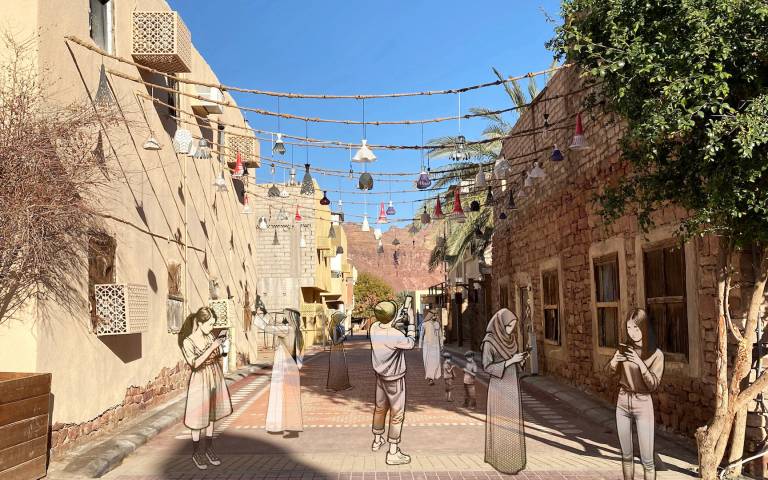MPhil/PhD Upgrade Seminar: Ahmed Jawdat
22 May 2024, 10:00 am–11:00 am

Hybrid Third Places as Catalysts for Innovative Placemaking: An Urban Design & Planning Exploration of the Connection Between Physical & Digital “Third Places”, Emerging Technologies, and Their Role in Social Interactions and Placemaking in Saudi Neighbourhoods.
Event Information
Open to
- All
Organiser
-
Emmy Thittanond
Location
-
Room 5.02The Bartlett School of Architecture22 Gordon StreetLondonWC1H 0QB
The term “third place” was coined by sociologist Ray Oldenburg (1999), referring to the place where people socialise in the city beyond their home (first place) and work (second place). These third places are the epicentre of public social life and interactions, crucial to well-being. “Placemaking” discourse has also emphasised social interactions as one of its key aims. With the rise of social media, scholars have argued that it could be a form of a “digital third place” (Digital-TP) since it embodies most of Oldenburg’s third place characteristics. As technology and Digital-TPs evolve, it is essential to understand their impact on our “physical third places” (Physical-TP) and their potential opportunities in urban design and planning. This research uses Saudi Arabia as the main context of investigation.
Since oil was discovered in Saudi Arabia in 1938, cities across the country have undergone significant transformations. Imported development schemes, such as Dhahran’s Aramco camp in 1939 (Al-Naim, 2008) and the car-centric Doxiades plan of Riyadh in 1968 (Elsheshtawi, 2022), influenced design and planning across major cities, resulting in modern neighbourhoods with limited “third places” that do not meet Oldenburg’s principles. However, the last seven years have seen significant shifts and reforms under Saudi Vision 2030, driving a new era of cultural and urban transformations. Key vision initiatives include the King Salman Charter for Architecture and Urbanism, highlighting six core values including: “authenticity”; understood as environments that belong “physically and emotionally to the place” (Architecture and Design Commission, 2022). Notably, recent years have seen an increase in public social life, both “physically” and “digitally”. In certain cases, the integration of both realms is driven by “authenticity”.
This research will investigate the connection between Physical-TPs, Digital-TPs, and emerging technologies and how they can be strategically integrated to promote “physical” social interactions and innovative placemaking strategies in Saudi neighbourhoods. To achieve this, a mixed-method approach will be used. The empirical part of the study will involve digital surveys, semi-structured interviews, focus groups, and digital and physical observations. The research will conclude with the development of an urban design and planning strategy, which practitioners, decision-makers, and researchers can utilise.
Image Caption: Collage image showcasing AlJadidah district in AlUla, Saudi Arabia with an overlay of people interacting with the third place physically and digitally. Background Image is taken in January 2023, and the people sketched are generated using DALLE.E AI software.
Supervisors: Dr Susan Moore (BSP), Professor Peter Bishop (BSA) and Professor Andy Hudson-Smith (CASA)
Upgrade Panel members: Professor Mathew Carmona (BSP), and Professor Peter Bishop (BSA)
About the Speaker
Ahmed Jawdat
Researcher in Urban Planning and Design at The Bartlett, University College London (UCL)
Ahmed Jawdat is an Architect, Urban Designer and Planner. He is currently a researcher in Urban Planning and Design at The Bartlett, University College London (UCL). Ahmed completed his studies in the United States between Miami and New York City. He obtained his Bachelors of Architecture from the University of Miami (B.Arch), and his Masters in Architecture and Urban Design (Ms.AUD) from Columbia University’s Graduate School of Architecture Planning and Preservation (GSAPP). Prior to starting his PhD, Ahmed worked on different projects across the Kingdom of Saudi Arabia, which are part of the Kingdom’s ambitious Vision 2030 and are key in improving and transforming the urban landscape in Saudi cities. Ahmed started his career at the UN Habitat Future Saudi Cities program, where he worked on the development of city profiles for various cities across Saudi Arabia, and giving recommendations on how to enhance the neighbourhoods and city wide level planning and design. He then worked on urban development, master planning, regeneration, and strategy formation in leading government and semi-government entities, including The Royal Commission for AlUla, The Architecture and Design Commission (affiliated with the Saudi Ministry of Culture), and Saudi Downtown Company.
 Close
Close

